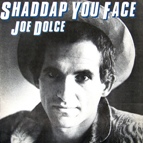When people cite songs like Agadoo, The Birdie Song and, this week’s single of the week, Shaddap You Face as being among the worst songs of all time, I have to disagree. The reason being; they are novelty songs and generally meant to be awful, but at least they’re memorable albeit for the wrong reason. My definition of a truly bad song is, among many I can name, You’ve Lost That Lovin’ Feeling by Cilla Black, actually anything by her is pretty horrendous, but that is only my opinion. If you haven’t heard it, treat yourself, actually, no ignore that, more like brace yourself when you give it a listen, but don’t say you weren’t warned!
Joe Dolce was born to Italian-American parents in Painesville, Ohio in 1947. In the late Seventies, he took a train journey from Ohio to California and to pass the time he wrote some poetry and songs based on classic verses by his favourites authors, W.B.Yeats and Dylan Thomas. In 1979 the Dolce family emigrated to Australia. It is there that Joe invented the Dolce Music Theatre Show which was funded by a grant. One character called Giuseppe who wore a Chico Marx hat, played a miniature mandolin and had an annoying fake Italian accent.
In the UK, Shaddap you Face is probably best remembered for keeping Ultravox’s Vienna off the top spot, but how did the song come about? “I was inspired to write it after I went to Italy to visit my Italian-born grandparents,” Joe remembered. “I went to their house for dinner and I was stunned by the way they talked. I hadn’t seen them for about four years and I certainly hadn’t heard that sort of talk like Shaddap your face and Whatsa matter you. It just struck me that those phrases could be turned into a good song, but as a send up. So on the way back to Australia I started writing the song, but then didn’t think much more about it.”
On arrival back in Australia, he started to fine-tune Shaddap You Face and began singing it in the character of Giuseppe and started putting in the show, “The audience absolutely loved it,” he said proudly. This prompted him to make a video which he tried to promote. “In those days, there were no music and video channels and my video was rejected everywhere,” he said, “But, finally I managed to get it on one morning television show and it created quite a stir. Soon we were getting hundreds of calls from people wanting to see it again. Then, it became funny, because all the TV shows that had rejected me were all ringing me up saying they had to get me on. The Don Lane show, which was the Australian equivalent of the Johnny Carson show in America, originally rejected me and then he announced on the show that I would be on next week and that was before he even asked me.”
The song was originally released in 1979 and topped the chart in Australia, Austria, Canada, Fiji, France, New Zealand, Ireland, Germany and Switzerland and made the top 10 in seven other countries – although surprisingly, not in Italy. It went on to sell over six million copies worldwide and, in 2004, celebrated its 25th anniversary as the best selling song in Australian music history. Such was the appeal of this novelty song that it inspired over 50 cover versions in a variety of languages, including one from Andrew Sachs in full character of Fawlty Towers’ hapless Spanish waiter, Manuel. There is even an Aborigine version that included dingoes yelping and a version by a Hungarian folk band.
Joe still performs the song that gave him his three minutes and 14 seconds of fame. It’s not the only royalty cheque he receives because in 1984 he wrote a song called Intimacy which was sung by his then girlfriend, Lin van Hek, and can be heard in the film Terminator.
The eponymous album that accompanied the single was a prodigious waste of plastic. As far as we know, it failed to chart in any country.
In recent years he has turned his attention to classical music and the writings of Sappho, Albert Schweitzer and Sylvia Plath, indicating there is a serious side to Joe. He once composed a song called Father, which dealt with the relationship with his violent father and his determination not to let the same thing happen in his own family.
His current artistic direction is in poem and essay writing. In the last two years he has published nine essays his most recent being Elysium in Paraguay in August this year.
